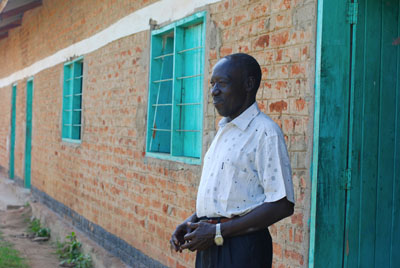
YEI, Central Equatoria State, Southern Sudan — We spent part of the morning with Mr. Bebe, headmaster of Yei Day Secondary School, who recently returned to his native Yei to fill the post of headmaster at the town’s only co-ed secondary school.
He talked about how after spending much of his teaching career in Uganda, where the education system is far more established, he jumped at the chance to return to Sudan and apply his decades’ worth of knowledge to improving opportunities for students in his hometown. Surveying the area with his eyes and responding to a question we hadn’t asked, he said, “Yes, I’ll retire in Yei.”
As we walked around the school grounds, Mr. Bebe pointed out the renovations underway on some of the buildings. During the war, the school was used as barracks for the Sudan People’s Liberation Army, which explains why the buildings mostly suffer from years of wear and tear rather than remnants of battle. Still, the school was in need of repair, and when the government told Mr. Bebe that they couldn’t help, he looked for alternatives. “When he [my government contact] has sent me to an NGO, he has sent me for good,” Mr. Bebe said. The Danish development agency agreed to pitch in, but Mr. Bebe was particularly pleased with the response he got from the community.
The students’ parents formed a “reconstruction task force” and started collecting funds to re-roof two of the classrooms. They raised enough money for one, and the fund for the second is just a few hundred dollars shy. Mr. Bebe said he is reasonably confident that work on the second roof will be able to start soon.
When our conversation shifted to his thoughts on the future of Sudan, Mr. Bebe seemed exasperated with what he seemed to think was inevitable. “Every side is preparing for war,” he said. “The problem is when will it come out.”
A soldier once himself, now very content to focus on improving his school, Mr. Bebe seemed to tire at the thought of renewed fighting between northern and southern Sudan.
“We cannot build a wall," he said. "The nomads will come to Bahr el Ghazal [an area northwest of Yei] to water their cattle. Then the Dinka will cross the border [when the seasons change]. We are here, meant to be sharing.”

